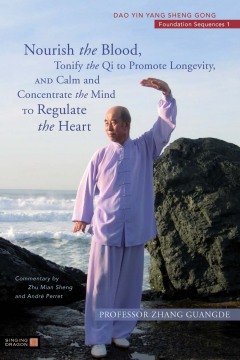
BOOK
Nourish the Blood, Tonify the Qi to Promote Longevity, and Calm and Concentrate the Mind to Regulate the Heart
(2011)
Additional Information
Book Details
Abstract
Professor Zhang Guangde's Dao Yin Yang Sheng Gong forms part of the Chinese national health program and is the most popular form of Qigong practiced in China and across the globe. Professor Zhang has spent nearly forty years creating and developing his system of Qigong. He combines the philosophy of the Classical Chinese text The I Ching with the primary theories of Chinese traditional medicine. His methods have proven highly effective in maintaining health and well-being.
This book contains detailed step-by-step instructions and illustrations to show every step of the foundation sequences, and the accompanying DVD will enable even the least experienced of students to begin to grasp this form of Qigong. The exercises featured promote controlled breathing and concentration. They are formed of calming movements which enhance the flow of blood and energy through the body to achieve increased flexibility and higher levels of physical and mental agility.
This will be an essential text for Qigong practitioners and students and is accessible enough for the beginning Dao Yin Yang Sheng Gong student.
Zhang Guangde is one of the best known Masters of Chinese Martial Arts. His methods of Qigong, called yang sheng tai ji and dao yin sheng gong, are based on the philosophies of Yi Jing, and are believed to have significant health benefits. There are today over four million people practising his version of dao yin.
Table of Contents
| Section Title | Page | Action | Price |
|---|---|---|---|
| Nourish the Blood, Tonify the Qi to Promote Longevity, and Calm and Concentrate the Mind to Regulate the Heart: Dao Yin Yang Sheng Gong Foundation Sequences 1 | 3 | ||
| Professor Zhang Guangde | 7 | ||
| Preface | 9 | ||
| Editorial Preface | 13 | ||
| Part 1: Nourish the Blood, Tonify the Qi\rto Promote Longevity | 15 | ||
| Introduction | 16 | ||
| Characteristics | 16 | ||
| Movement (standing) | 21 | ||
| Preparation | 21 | ||
| First movement: Embrace energy | 23 | ||
| Second movement: Gather The Subtle energy of the sun and the moon | 25 | ||
| Third movement: Draw Out energy | 26 | ||
| Fourth movement: Bring energy to the Dan Tian | 28 | ||
| Fifth movement: Revere Buddha | 30 | ||
| Sixth movement: Rinse the mouth | 32 | ||
| Closing | 33 | ||
| Movement (seated) | 33 | ||
| Explanation | 34 | ||
| Additional details | 37 | ||
| Photographs | 40 | ||
| Part 2: Calm and Concentrate the Mind to\rRegulate the Heart | 53 | ||
| Introduction | 54 | ||
| Characteristics | 57 | ||
| Movement (standing) | 60 | ||
| Preparation | 60 | ||
| First movement: Concentrate the mind on Dan Tian | 62 | ||
| Second movement: Draw the heart into Ming Men | 63 | ||
| Third movement: Gather energy through Lao Gong | 65 | ||
| Fourth movement: Bring the attention to Yong Quan | 66 | ||
| Fifth movement: Circulate energy between Ren mai, the Conception Vessel and Du mai, the Governing Vessel | 68 | ||
| Closing | 70 | ||
| Movement (seated) | 72 | ||
| Explanation | 72 | ||
| Photographs | 76 | ||
| Appendix 1: Dan Tian 丹田 The Cinnabar Field | 85 | ||
| Appendix 2:Cai Qi Zhang 采氣掌 The Energy Collecting Palm | 89 | ||
| Appendix 3: Que Qiao 鹊桥 The ‘Magpie Bridge’ | 91 | ||
| Appendix 4: Xiao Zhou Tian 小周天 The Small Celestial Cycle\r | 93 | ||
| Appendix 5: Massaging the Face | 101 | ||
| Appendix 6: Acupoints Used in the Foundation Sequences | 105 | ||
| Appendix 7: Zhan Zhuang 站桩 \rThe Rooting Posture: Techniques for Progression | 107 | ||
| Appendix 8: The International Institute of Dao Yin Yang Sheng Gong The School of Professor Zhang Guangde | 119 | ||
| Zhu Mian Sheng | 123 | ||
| André Perret | 125 | ||
| Mark Atkinson | 127 |
